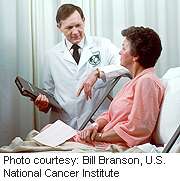Early response is an indicator for rectal cancer survival

(HealthDay) -- In patients with locally advanced rectal cancer undergoing radical resection, response to neoadjuvant chemoradiotherapy is an early marker that correlates with rates of recurrence-free survival, distant metastases, and local recurrences, according to research published online April 9 in the Journal of Clinical Oncology.
In Ja Park, of The University of Texas M.D. Anderson Cancer Center in Houston, and colleagues conducted a retrospective chart-review study to evaluate oncologic outcomes associated with the degree of pathologic response after 725 patients with locally advanced rectal carcinoma received treatment with preoperative chemoradiotherapy and radical resection.
The researchers found that, overall, 18.1 percent of patients exhibited a complete tumor response, 29.0 percent had an intermediate response, and 53.0 percent had a poor response. Complete tumor response was associated with a 90.5 percent five-year recurrence-free survival (RFS), intermediate tumor response with a 78.7 percent RFS, and poor tumor response with a 58.5 percent RFS. Distant metastases at five years occurred in 7 percent of complete responders, 10.1 percent of intermediate responders, and 26.5 percent of poor responders. Local recurrence rates at five years occurred in none of the complete responders, 1.4 percent of the intermediate responders, and 4.4 percent of poor responders.
"We found that oncologic outcomes after preoperative chemoradiotherapy for locally advanced rectal cancer are correlated with treatment response. Final pathologic stage is an early response indicator for long-term outcomes that provides better prognostication than does the clinical stage. Patients who achieve CR and undergo radical resection have excellent prognosis with low risk for local or distant recurrence," the authors write.
One of the authors disclosed receiving funding from Genentech.
More information:
Abstract
Full Text (subscription or payment may be required)
Copyright © 2012 HealthDay. All rights reserved.














